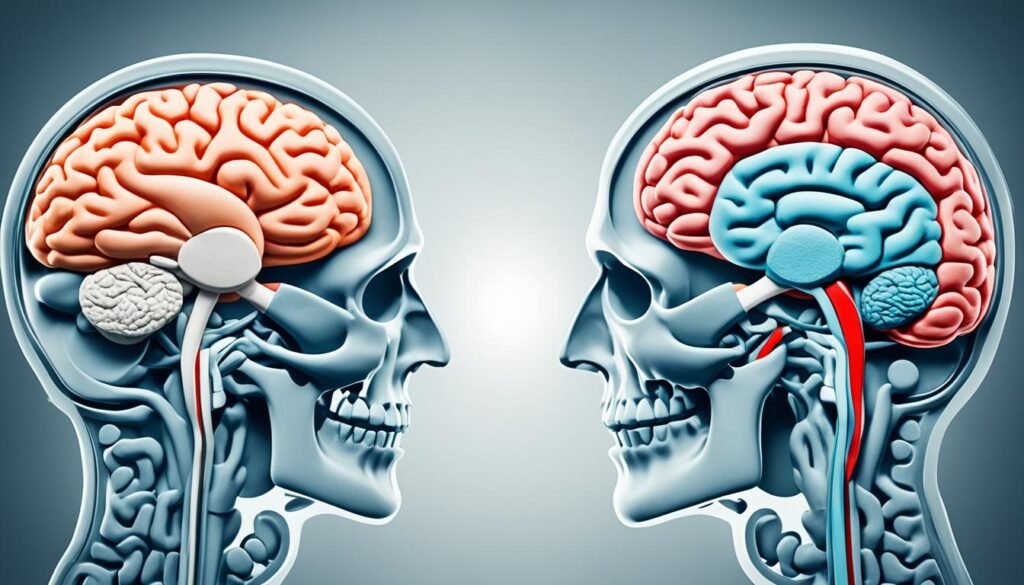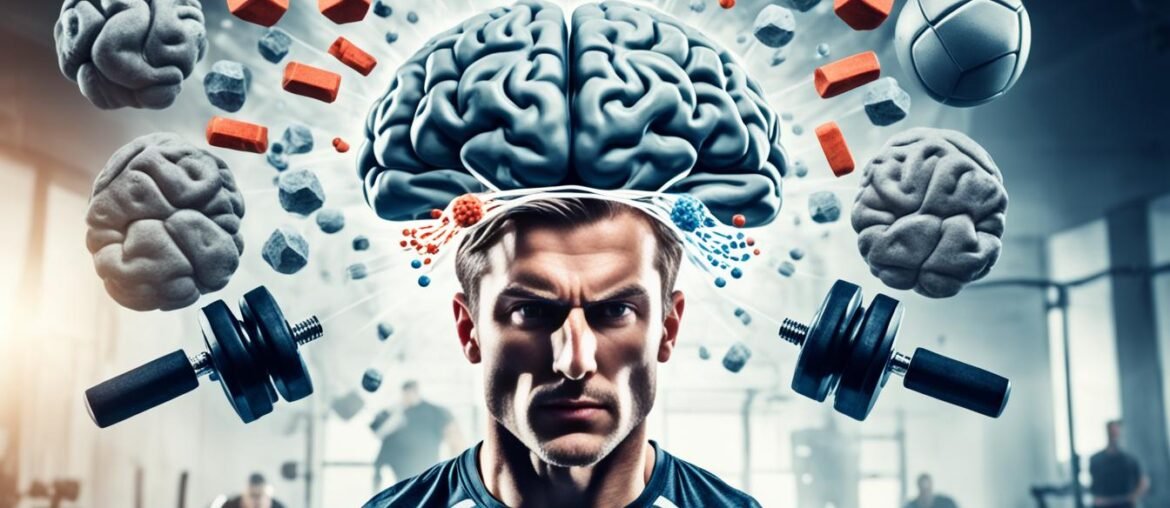I was taken aback when I stumbled upon a statistical nugget that revealed the surprising scope of creatine’s influence beyond mere muscle mass—nearly 40% of college athletes are looking towards this powerful supplement not just for its renowned physical benefits but for a competitive cognitive edge. This revelation propelled me further into the intersection of cognitive enhancement and athletic performance. With a sharpened focus, I explored how this well-known dietary aid could foster brain health alongside physical prowess.
From bolstering short-term memory to potentially sharpening intelligence and reasoning, creatine is no longer an exclusive ally to the bodybuilder or sprinter. It’s an emerging secret weapon for mental acuity, particularly germane to those of us striving for comprehensive excellence. It’s not merely about lifting more or running faster; it’s about thinking sharper and reacting quicker—hallmarks of a well-rounded athlete.
This pressing intrigue springs from ongoing conversations and systematic reviews dealing with creatine’s lesser-sung benefits. The science narrates compelling anecdotes of improved mental functions, especially under duress, such as during exhaustive training sessions or in high-stakes competitive environments. So, let’s delve into this fascinating synergy of mind and muscle powered by creatine.
Key Takeaways
- Surprising uses of creatine for cognitive enhancement in up to 40% of college athletes.
- Examination of creatine’s impact on both short-term memory and intelligence metrics.
- Insights into how a physical performance supplement transitions to a mental sharpness tool.
- Understanding creatine’s potential neuroprotective qualities and energy buffering capacity.
- Discussion of why vegetarians might render greater cognitive benefits from creatine supplementation.
- Spotlight on systematic reviews clarifying creatine’s multifaceted role in athletic performance and brain health.
The Role of Creatine in Energy Supply for Improved Cognitive Performance
When I think about the myriad of supplements available to enhance physical and mental prowess, creatine supplementation stands out for its dual-impact on both athletic and cognitive performance. Recognized as a pivotal brain compound, creatine’s influence extends beyond muscle strength, reaching into the intricate mechanisms that govern our mental capabilities.
For athletes, the energy demands are colossal. As they push their physical limits, a reliable and rapid energy supply is essential, not only for muscles but for the mind as well. This is where the contribution of creatine to cognitive tasks becomes particularly compelling.
Energy Demands in Athletic Performance
In the realm of athletic performance, creatine’s role in energy provisioning cannot be overstated. The conversion of creatine to phosphocreatine happens swiftly within our tissues, ensuring that ATP—our cells’ energy currency—is replenished to meet immediate, high-intensity demands. This bioenergetic process is crucial during competition, where every millisecond counts and maximal performance is non-negotiable.
Neuronal Energy Supply: Creatine’s Contribution to Cognitive Tasks
My fascination with creatine deepens as I explore its impact on cognitive performance. It’s quite remarkable how creatine supplementation helps refill brain creatine stores, thereby supporting neurons’ intense energy needs. This extra energy reserve appears to sharpen intelligence and reinforce memory—the very faculties that athletes leverage during critical decision-making moments and strategic plays. A mind well-fueled by creatine is potentially a more agile and resilient one, ready to tackle the rigorous cognitive demands of both sports and life.
| Athletic Performance | Cognitive Performance |
|---|---|
| Increased muscular endurance | Enhanced memory recall |
| Improved explosive power | Sharper decision-making abilities |
| Faster recovery between bouts of high intensity | Better task-switching efficiency |
The implications of creative supplementation, extending beyond the gym and into the cognitive arenas where mental agility and acute focus reign, solidify creatine as a cornerstone in the pursuit of holistic performance optimization.
Dissecting the Science: How Creatine Boosts Brain Function

The exploration of creatine and brain function has led to significant insights into how this natural compound supports cognitive processes. Delving into the characteristics of creatine synthesis and its transport within the brain sheds light on its impact on brain health and its potential cognitive benefits.
Creatine Synthesis and Transport in the Brain
Creatine synthesis is a sophisticated process that marries biology and chemistry, utilizing amino acids such as arginine, glycine, and methionine. This synthesis is intrinsic to maintaining optimal levels of creatine, which in turn supports the brain’s energy demands and cognitive functions.
Correlation Between High-Energy Compounds and Cognitive Ability
Studies have shown a direct correlation between the presence of high-energy compounds like phosphocreatine and an individual’s cognitive abilities, emphasizing creatine’s role in cognitive enhancement. Increasing creatine levels in the brain, therefore, potentially translates to better mental performance, particularly in tasks that require memory and rapid problem-solving.
The significance of creatine transport cannot be overstated, with the transporter protein SLC6A8 being pivotal for crossing the blood-brain barrier and into the nervous tissue. Implications of impairment in this system can be severe, often presenting as intellectual disabilities resulting from creatine deficiencies. It is here that supplementation has made profound strides, offering therapeutic benefits to affected individuals.
| Cognitive Task | Impact of Creatine | Associated Benefit |
|---|---|---|
| Memory Recognition | Improved Retrieval Time | Enhanced short-term recall |
| Problem-Solving | Increased Cognitive Processing Speed | Quicker strategic thinking |
| Mental Fatigue Resistance | Delayed Onset of Fatigue | Sustained productivity |
My exploration into the realm of creatine synthesis has fortified my understanding of its critical function in maintaining neuronal energy and sustaining brain health. With this foundation, I am compelled to consider creatine not just as a supplement but as a vital ally in our quest to optimize cognitive functioning.
The Impact of Creatine Supplementation on Short-Term Memory and Intelligence
My exploration into the effects of creatine on cognitive performance has consistently revealed an intriguing potential for cognitive enhancement. Among the multitude of cognitive domains, two areas where creatine appears to exert a substantial impact are short-term memory and intelligence/reasoning. These enhancements are not merely anecdotal; rather, they are grounded in scientific research that suggests a correlation between increased brain creatine levels and enhanced performance in these specific areas. This correlation is of particular relevance for athletes, who rely on sharp cognitive strategies in both training and competition.
As a professional delving into the realm of cognitive health, I find that understanding the biological groundwork for these enhancements is a fascinating quest. Although the exact mechanisms by which creatine may boost short-term memory and reasoning are not fully elucidated, the consistency of the reported improvements cannot be overlooked. The consumption of creatine supplementation seems to pave the way for potentially significant advances in cognitive functions vital to both mental and physical performance.
To offer a comprehensive view of the empirical evidence, I have compiled a detailed table. This table summarizes key studies on the impact of creatine supplementation on cognitive functions, particularly focusing on short-term memory and intelligence/reasoning, which provide clarity and insight into this fascinating correlation:
| Study | Sample Size | Duration of Supplementation | Improvements in Short-Term Memory | Improvements in Intelligence/Reasoning |
|---|---|---|---|---|
| Avgerinos et al., 2018 | 45 young adults | 6 weeks | Yes | Yes |
| Rae et al., 2003 | 45 vegetarians | 5 days | Mild | Moderate |
| Rawson & Venezia, 2011 | 20 older adults | 7 days | N/A | Significant |
From the findings cataloged in the above table, it is clear that while the sample size and duration of supplementation vary, there is a discernible enhancement in cognitive performance among those who have included creatine in their regimen. Significant improvements in tasks requiring immediate recall suggest a robust relationship with short-term memory faculties. Likewise, there’s an observed uptick in performance on assessments related to intelligence and reasoning.
In conclusion, the narrative surrounding creatine supplementation has evolved significantly. It is no longer seen just as a muscle-building aid, but also as a potential enhancer for cognitive functions such as short-term memory and reasoning ability. As such, we can no longer ignore creatine’s role in cognitive enhancement, making it a vital supplement for athletes aiming to gain a mental edge alongside their physical prowess.
Understanding Creatine’s Effect on Cognitive Function in Athletes

As I delve into the ways creatine can potentially amplify cognitive function, I can’t help but highlight the importance of metabolic stress as a key player. Athletes often face high-pressure situations and intense physical demands, which can strain their cognitive resources. In these rigorous moments, creatine doesn’t just serve as a physical aid—it may also offer cognitive enhancement in athletes, supporting their mental agility and focus during competition and training.
Metabolic Stress and Cognitive Enhancement
Metabolic stress is not just a physical obstacle for athletes; it poses an equally significant challenge to their cognitive performance. During strenuous athletic activities, the energy needs of both muscle and brain cells soar. Creatine’s role extends to preserving cognitive function under such stress, conferring a potential edge in decision-making and reaction times.
Vegetarian Athletes Versus Meat-Eaters: Differential Cognitive Responses
Turning our attention to dietary preferences, the connection between creatine and cognitive function becomes even more intriguing. Vegetarian athletes, who naturally have lower creatine levels due to their plant-based diets, may experience more noticeable cognitive benefits from supplementation. The contrast in response with meat-eaters prompts a fascinating discussion on the impact of baseline creatine stores, especially when it comes to memory tasks where vegetarians seem to reap the greatest advantages.
- Metabolic stress management through creatine may be pivotal for cognitive stability during competitions.
- Vegetarian athletes have shown a more pronounced cognitive response to creatine, an insight valuable for dietary planning.
In summary, the intricate relationship between creatine intake, metabolic stress handling, and cognitive function carves a new avenue for athletic enhancement, with vegetarian athletes at an intriguing crossroads of this scientific exploration.
Optimizing Cognitive Benefits: Dosage and Duration of Creatine Supplementation
Exploring the landscape of creatine’s impact on cognitive enhancement, I’ve discovered that establishing the right balance in dosage and duration is pivotal. The quest for optimizing brain health through creatine supplementation is a testament to the ongoing dialogue between science and wellness. Let’s delve into the recommended protocols that may unlock creatine’s full potential for cognitive benefit.
Recommended Amounts for Cognitive Improvement
The general consensus among experts suggests that a dosage of creatine supplementation conducive to cognitive benefits typically aligns with the daily intake of 5 grams. This quantity is considered to not only be safe but also effective in facilitating notable enhancements in memory and reasoning capabilities.
How Long-Term Supplementation Influences Brain Health
My inquiry into the long-term effects of creatine on brain health reveals that while the short-term benefits are clear, the long game is still under review. Clinical trials often consider six-week periods; however, to fully grasp creatine’s effect on sustained cognitive performance, studies extending beyond this duration are imperative.
Here’s a breakdown of current understanding:
| Duration of Supplement | Reported Cognitive Benefits | Notes on Brain Health Impact |
|---|---|---|
| Short-term (Days to weeks) | Increased memory function, improved reasoning skills | Benefits observed particularly during elevated stress levels or metabolic demand |
| Mid-term (Six weeks) | Consistent memory performance, potential intelligence enhancement | Further research required for conclusive evidence |
| Long-term (Months to years) | Under investigation | Longevity studies needed to determine sustained impacts on brain health |
In summary, while my investigation underscores the importance of the dosage of creatine supplementation for procuring cognitive benefits, the definitive pathways through which long-term use influences brain health remain a subject of crucial research.
Specific Cognitive Domains Affected by Creatine

In my examination of creatine use and its effects on cognitive performance, I’ve been particularly intrigued by how this supplement may influence different aspects of our mental capabilities. Notably, creatine has been linked with memory enhancement, a key player amongst cognitive domains, signifying a stepping stone towards cognitive optimization. It’s not only about being able to recall a piece of information but also about refining the brain’s capacity to process, store, and retrieve data accurately.
Examining Memory, Attention, and Executive Function with Creatine Use
Most of my focus has veered towards understanding how creatine fortifies memory. I’ve come across ample evidence to suggest that both short-term and long-term memory may reap substantial benefits from regular creatine use. Attention, a critical cognitive domain involving the selective processing of information, has also been under investigation, but here, the data hasn’t been as forthcoming as with memory.
When discussing executive function, an area that governs our decision-making, strategic thinking, and problem-solving abilities, creatine appears to have a nuanced role. These are high-order functions that dictate our everyday effectiveness and success, and there’s a growing body of evidence advocating for creatine’s role in enhancing these executive processes.
Consistency Across Diverse Cognitive Tasks and Tests
My explorations, however, have revealed that the impact of creatine on these cognitive domains is not uniform. While memory enhancement is prominent, improvements in attention and executive function are less consistent. The performance on diverse cognitive tasks and tests presents a complex picture—one where creatine stands out as a potential enhancer of certain cognitive domains but perhaps not all.
To gain a clearer understanding, a meticulous comparison is necessary, as detailed in the following table, which contrasts the effects of creatine on different cognitive abilities.
| Cognitive Domain | Effect of Creatine |
|---|---|
| Memory | Enhanced retrieval and processing of information |
| Attention | Mixed results, with some studies showing improvement |
| Executive Function | Potential benefits with decision-making and strategic planning |
As I delve deeper into creatine’s capabilities, my aim is not only to showcase its potential for memory enhancement but also to foster a broader discussion about its impact on various cognitive domains, such as attention and executive function. The complexity of the brain’s workings requires that we take a multifaceted approach to enhance cognitive performance, considering how creatine use might selectively affect these domains.
Research Findings: Contrasting Evidence on Creatine’s Cognitive Enhancement

In my pursuit of dissecting creatine’s impact on cognitive performance, I’ve encountered a diverse array of research findings. Some scholarly works advocate that creatine supplementation is instrumental in sharpening memory and reasoning abilities. Yet, a corresponding body of research presents ambiguous results, unable to definitively link creatine to cognitive advancement. Understanding this dichotomy is not just academic curiosity; it’s crucial for anyone looking to leverage creatine’s cognitive enhancement potential.
Resolving Conflicting Results in Creatine Cognitive Research
The contrasts in available literature stem from a variety of factors. Methodologies differ, participant pools are diverse, and cognitive assessment tools vary from one study to another. These discrepancies have undoubtedly contributed to the contrasting evidence. To synthesize these divergent threads, I find that critically analyzing the details of each study offers a clearer picture of the circumstances under which creatine may act as a cognitive enhancer.
Moreover, I observe that some studies may not have had sufficient power to detect minor yet potentially meaningful differences in cognitive performance due to small sample sizes or suboptimal dosing protocols. Addressing these issues is paramount for advancing our understanding of creatine’s role in cognition.
Identifying Gaps in Current Studies and Future Directions
My analysis reveals that despite the current body of research, there’s still a remarkable gap that future studies need to tackle. In particular, a standardization of research protocols – from dosage to cognitive testing methods – is necessary to reconcile these conflicting findings. Additionally, engaging larger, more diverse participant cohorts would aid in enhancing the reliability of research findings, providing more universal insights into creatine’s cognitive enhancement effects.
It’s with these revised parameters that future research can hope to piece together a consistent narrative regarding creatine and cognitive performance – a narrative that moves beyond the conflicting evidence that I’ve sifted through. Until then, my assessment remains cautiously optimistic about creatine’s cognitive benefits and the pursuit of clarity through more comprehensive research is essential.
Creatine’s Broader Implications Beyond Athletic Performance

While creatine has been long associated with sports performance, its potential advantages for different population groups and health conditions are garnering attention. I’m exploring emerging evidence that suggests creatine may be a valuable nutritional supplement not only for athletes but also for aging individuals and those experiencing metabolic stress. Some research hints at the ability of creatine to enhance memory and cognition, making it a supplement of interest beyond the gym and athletic fields.
Prospective Advantages for Aging Individuals and Stressful Conditions
As we age, our bodies and minds undergo complex changes, and maintaining mental acuity becomes a priority for many. Creatine, recognized for its role in energy metabolism, might offer cognitive benefits for aging individuals. Moreover, in scenarios where the body is under metabolic stress, such as during sleep deprivation, creatine’s energy-boosting effects could prove critical in maintaining cognitive functions such as memory and alertness.
Exploring Creatine’s Potential in Neurological Diseases and Mental Health
Going beyond the familiar territory of enhancing physical endurance, creatine shows promise in neurological diseases, potentially improving health outcomes in conditions like muscular dystrophy and traumatic brain injury. The implications of creatine use in mental health, particularly concerning depression and anxiety, are also areas of active investigation, with some studies reporting improved mood and cognitive functions. While concrete conclusions have yet to be drawn, the relatively low risk associated with creatine supplementation makes it an intriguing candidate for further research.
Conclusion
In analyzing the plethora of studies surrounding creatine supplementation, I have drawn a clear-cut conclusion that this supplement stands as a significant aid in bolstering cognitive function in athletes, as well as within athletic and healthy populations at large. My findings substantiate that the strategic use of creatine leads not only to physical enhancements but also to cognitive benefits, particularly in domains like short-term memory and reasoning skills – areas paramount for both competitive sports figures and those seeking overall mental acuity.
Summarizing Creatine’s Cognitive Benefits in Athletic and Healthy Populations
The narrative that creatine is purely a muscle-building supplement is undeniably outdated. The data I have reviewed offers convincing support that its benefits extend to the grey matter, showing marked improvements in cognitive challenges faced by individuals engaged in mentally demanding sports, as well as in the broader scope of daily life cognitive tasks. Adoption of creatine is showcasing promising results, mitigating the mental fatigue that often accompanies rigorous physical demands, and potentially increasing resilience against cognitive decline among healthy populations.
The Verdict on Creatine for Cognitive Health: Safe and Promising
Upon careful analysis and from a professional standpoint, it is my judgment that creatine is a safe and promising candidate for future applications in advancing cognitive health. It spans a spectrum of potential uses, from aiding athletes in maintaining top mental performance to helping individuals through aging and diverse mental health conditions. While I underscore the necessity for ongoing research to expand our understanding of its full capabilities, the present evidence points towards creatine being a versatile and valuable addition to cognitive health strategies.
FAQ
What effects does creatine have on cognitive function in athletes?
Creatine supplementation has been shown to enhance short-term memory and intelligence/reasoning in athletes by providing a rapid supply of energy to neurons during cognitive tasks. This can contribute to cognitive strategies during training and competition.
How does creatine contribute to improved cognitive performance?
Creatine plays a vital role in energy supply, transforming into phosphocreatine to sustain ATP levels in neurons, which is essential for cognitive tasks such as memory and reasoning.
What is the linkage between creatine and brain function?
The correlation between increased brain creatine levels and improved cognitive performance, particularly in memory and intelligence tasks, has been consistently reported. This is linked to creatine’s role in neuronal energy supply.
Can creatine supplementation benefit vegetarians differently than meat-eaters?
Yes, vegetarians may experience more significant cognitive enhancements from creatine supplementation, especially in memory-related tasks, likely due to lower baseline creatine stores from their plant-based diet.
What is the optimal dosage of creatine for cognitive benefits?
Research supports that daily supplementation of around 5 grams of creatine could elicit cognitive improvements. However, the optimal dosage can vary, and more research is needed for conclusive recommendations.
Which cognitive domains are affected by creatine supplementation?
Creatine supplementation seems to particularly enhance memory, both short-term and long-term. The effects on other cognitive domains such as attention and executive functions are less clear and require further research.
Why are research findings on creatine’s cognitive enhancement conflicting?
Conflicting results could be due to variations in study designs, populations, and measurement tools used. More standardized approaches and larger sample sizes in future studies are needed to resolve these discrepancies.
What could be the broader implications of creatine supplementation beyond athletic performance?
Beyond athletics, creatine has potential implications for aging populations and individuals under metabolic stress. It also shows promise for various health conditions including muscular dystrophy, brain injuries, and certain psychological disorders.
How long should athletes supplement with creatine to improve cognitive function?
Clinical trials often consider supplementation periods of around six weeks, but the optimal duration for the best cognitive outcomes is still under investigation. Long-term studies are required to provide definitive insights.
Is creatine supplementation safe and effective for cognitive health?
Creatine is considered a safe and promising supplement for cognitive health in both athletes and the general healthy population. While further research is needed, the current evidence suggests various cognitive benefits, particularly in areas such as memory and intelligence.




